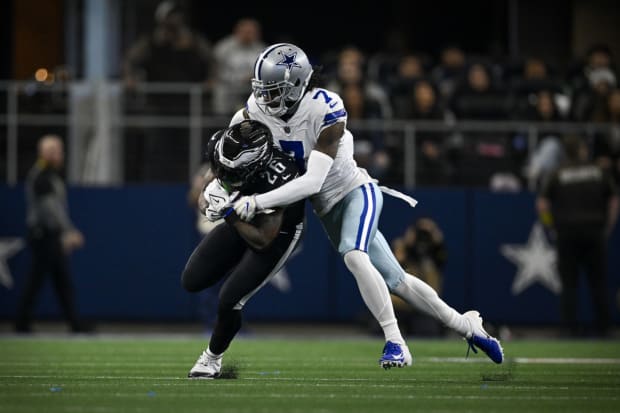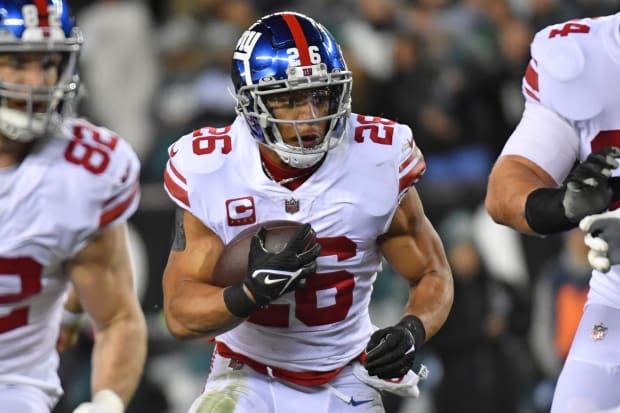With the NFL offseason quieting down, many teams will use the time between now and training camp to start thinking about finances.
Which contracts should be extended? Who makes for a smart post–June 1 cut or trade? Who is available to acquire from another team, and who remains on the market?
We looked at each team in the NFC and ran down the most pressing decision each has to make in the coming weeks and months. For some, it’s a player on the franchise tag. For others, it’s a star set to hit free agency. And then there are studs on rookie deals, soon eligible to start negotiating for much more.
Here’s how each shakes out for all the NFC teams.
Watch the NFL with fuboTV. Start your free trial today.
Arizona Cardinals: DeAndre Hopkins
No shock here. The Cardinals are in the midst of a rebuild, meaning a 31-year-old Hopkins is not necessarily worth the effort (or money). Hopkins has two years left on his deal at cap hits of $29.98 and $25.45 million, respectively. If traded, the former All-Pro receiver becomes slightly more affordable with base salary figures of $19.45 and $14.91 million.
If Arizona can’t trade Hopkins, though, it’s time to consider a post–June 1 release to save money and use it as rollover space for 2024. Should the Cardinals decide to go this direction, they would recoup $34.3 million over the lifetime of Hopkins’s deal.
Atlanta Falcons: A.J. Terrell
Terrell is 25 years old and one of the league’s best corners. He’s also been one of the NFL’s best-kept secrets, playing in relative anonymity with the Falcons, but that’s about to change.
Entering his fourth season in Atlanta, Terrell is now eligible for an extension. This spring, general manager Terry Fontenot picked up his fifth-year option, essentially putting the former first-round pick on a two-year deal worth $16.9 million.
If the Falcons enter into extension talks, they should expect the deal to approach the market’s top end for the 2021 second-team All-Pro. Think approximately $19 million per year.
Carolina Panthers: Brian Burns
Burns will eventually be paid life-changing money, but will it come from the Panthers? After four years and 38 sacks, the two-time Pro Bowler is still without a second contract. Entering the final year of his rookie pact, Burns and Carolina are heading for an inflection point.
If the Panthers are so inclined, they can play out the year and let Burns hit free agency, potentially bringing back a compensatory pick. However, the most likely scenario includes a franchise tag to provide more time for contract talks, or an extension slightly more than the Harold Landry deal, which came in at $87.5 million ($52.5 million guaranteed) over five years.
Chicago Bears: Justin Fields
Nobody is more excited to have a potentially mammoth deal to pay than the Bears for Fields. The only franchise to never have a 4,000-yard passer in a season, Chicago watched Fields begin to blossom last year, accounting for 3,385 total yards and 25 touchdowns.
Fields is extension-eligible once the 2023 season ends, and if he breaks through with a Pro Bowl–level campaign, his value instantly rises into the $40 million–plus category. While there’s still ample uncertainty on whether Fields has such a year, the Bears are hoping to finally land a franchise quarterback, even if that means a record-breaking contract for the team.
Dallas Cowboys: Trevon Diggs
Another star with one year left on his rookie deal, Diggs has a significant season ahead. After a breakout 2021 campaign in which he intercepted a league-high 11 passes to make first-team All-Pro, Diggs is coming off a second consecutive Pro Bowl season.

Jerome Miron/USA TODAY Sports
Dallas owner Jerry Jones typically pays his stars. However, the Cowboys may have a cap crunch. Quarterback Dak Prescott makes $40 million per year, while defensive end DeMarcus Lawrence is on a $105 million contract. Plus, All-World edge rusher Micah Parsons is eligible for an extension after this year, Pro Bowl receiver CeeDee Lamb became eligible this offseason and running back Tony Pollard is on the franchise tag.
Will the Cowboys pay Diggs like an elite corner, eat a large cap number on a franchise tag in 2024 or allow him to walk?
Detroit Lions: Jared Goff
Entering 2022, Goff seemed certain to be a middling bridge quarterback for the Lions until they found a young answer in the draft. Then the season unfolded, and the former No. 1 pick threw for 4,438 yards and 29 touchdowns against seven interceptions, leading Detroit to a surprise 9–8 record.
Goff has two years remaining on his contract at palatable cap hits of $30.97 and $31.97 million, respectively. The Lions could allow those figures to play out and then use a franchise tag if necessary. Or, Detroit general manager Brad Holmes could move on an extension after this season if Goff has another Pro Bowl–level campaign at age 29.
Green Bay Packers: Rashan Gary
Of all the scheduled 2024 free agents, Gary is one of the most fascinating. After two seasons of being a part-time player, Gary emerged as a star over the past two years, totaling 15.5 sacks for the Packers across 25 games.
With Gary entering the final year of his rookie deal, general manager Brian Gutekunst has to wrestle with the edge rusher’s value, and whether it’s best to extend him this summer or allow the season to play out. Either decision is a risk, but the higher-upside move is to bet on the former first-round pick’s talents, saving money if Gary does have his best year yet.
Los Angeles Rams: Van Jefferson
There weren’t a lot of choices for the Rams, who have some megacontracts in receiver Cooper Kupp, quarterback Matthew Stafford and defensive tackle Aaron Donald, but little in the way of younger players to extend. However, one exception is Jefferson, who enters 2023 at 27 years old and in the final year of his rookie deal.
Jefferson has posted two nondescript years sandwiched around Los Angeles’s Super Bowl season, when he amassed career highs in receptions (50) and yardage (802), plus six touchdowns. A new contract isn’t going to be super costly for the Rams, but they may also want to move on if Jefferson has another down year.
Minnesota Vikings: Dalvin Cook
It’s tough to argue for anybody else in Minnesota, considering the tenuous state of Cook. While the Vikings will eventually have to give a likely record-setting extension to receiver Justin Jefferson next winter, their four-time Pro Bowl running back requires immediate attention.
Cook has still three years remaining on his contract, but only $6.2 million of it is guaranteed. At 27 years old, he’s looking to secure one more big payday, but who is willing to pay the upcoming base salaries of $10.4, $11.9 and $13.9 million over the next three seasons? If nobody bites and the Vikings don’t want to pay Cook, he could get released despite excellent productivity.
New Orleans Saints: Pete Werner
It’s hard to find a player on the Saints who either isn’t one of the league’s worst contracts, or someone who is already signed to a justifiably large deal. Enter Werner, the 23-year-old linebacker has two years left on his rookie deal and becomes extension eligible in 2024.
Werner was a second-round pick in 2021 and has played reasonably well since then, notching 142 tackles, including 80 last year with two forced fumbles. General manager Mickey Loomis needs production that comes with smaller cap hits, and Werner could be such a player, especially if New Orleans decides to move early and trade security for a lesser figure.
New York Giants: Saquon Barkley

Eric Hartline/USA TODAY Sports
The Giants took care of both quarterback Daniel Jones and defensive tackle Dexter Lawrence this offseason, but Barkley is still waiting for his long-term deal. The 26-year-old was given the franchise tag, a $10.9 million offer for 2023 he’s yet to sign.
If New York wants, it can wait Barkley out and dare him to give up his biggest annual salary yet. However, they can also find a compromise before the deadline July 15. If an extension takes place, it’ll likely be top-of-market, which comes in around $16 million per year and $35 to 40 million guaranteed. Finally, Giants general manager Joe Schoen could move Barkley in a deal, provided he’ll sign the tag to allow the transaction.
Philadelphia Eagles: DeVonta Smith
Eagles general manager Howie Roseman typically takes care of his high-end talent, and Smith figures to be no different. Only 23 years old, the former first-round pick hasn’t made a Pro Bowl but has amassed 2,112 receiving yards and 12 touchdowns across two years. Next offseason, Smith will be eligible for a new deal.
Looking at comps, Smith could command about $23 million annually with $55 million guaranteed, similar to the deal signed by Commanders star Terry McLaurin, and a bit less than teammate A.J. Brown. Of course, Smith can also boost those figures by playing out more of his rookie deal while continuing to produce.
San Francisco 49ers: Brandon Aiyuk
Like Smith, Aiyuk has produced a 1,000-yard season but hasn’t been to a Pro Bowl. However, the Niners’ standout receiver is also a year further into his rookie deal (despite both players being 25 years old). After playing on a cap hit of $3.98 million this year, the number jumps to $14.1 million on Aiyuk’s fifth-year option.
It could be tough for San Francisco to pay Aiyuk, considering its other large-cap charges include tight end George Kittle, receiver Deebo Samuel and running back Christian McCaffrey. If general manager John Lynch does decide to make room, expect an annual salary north of $20 million and guarantees into the $50 to 60 million range.
Seattle Seahawks: Tyler Lockett
By selecting Jaxon Smith-Njigba in the first round, the Seahawks could be telling us something about their long-term plans involving veteran receiver Lockett.
Lockett, 31, has an $11 million cap hit in 2023, and that figure will skyrocket to $26.895 million over each of the following two seasons. While he has notched four consecutive 1,000-yard campaigns, it’s tough to envision Seattle paying both Lockett and DK Metcalf deep into the future if Smith-Njigba turns into a viable threat.
Next offseason, Lockett could be a valuable trade chip. For an acquiring team, he would count $15.3 million against the cap in each of the last two seasons of his current deal. And for the Seahawks, executing the move post–June 1 would mean a total savings of $34 million.
Tampa Bay Buccaneers: Mike Evans
Barring a miracle, this is going to be a tough season for the Buccaneers. After three straight seasons of the playoffs including a Super Bowl victory with Tom Brady under center, general manager Jason Licht understands the road ahead.
With this in mind, what does the future hold for Evans? At 30 years old, Evans is entering the final year of his deal. For Tampa Bay to lose him after this year for nothing makes no sense. The Buccaneers either have to plan for the franchise tag, extend Evans before he becomes a free agent or trade him.
A post–June 1 trade would help Tampa Bay jump-start a rebuild while saving $14.5 million against the cap.
Washington Commanders: Montez Sweat
Sweat is playing on his fifth-year option this season, with free agency looming for the first time in his career. After seeing the Commanders decline Chase Young’s option, it makes sense to think Washington would want to re-sign Sweat, who has 28 sacks across four seasons, including a career-best nine in 2020.
Retaining Sweat shouldn’t be a massive cost. He’s a good player, but one who, at 27 years old, hasn’t reached the Pro Bowl or amassed double-digit sacks in a season. A good comparison for his next deal is Emmanuel Ogbah, who signed a four-year, $65.5 million deal ($32 million guaranteed) at age 28 after totaling 26.5 sacks over his previous four seasons.







